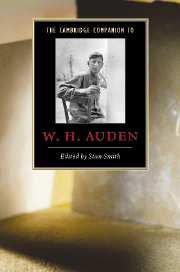Book contents
- Frontmatter
- 1 Introduction
- 2 Auden's life and character
- 3 Auden's England
- 4 Auden in America
- 5 The European Auden
- 6 Auden's travel writings
- 7 Auden's plays and dramatic writings
- 8 Auden's light and serio-comic verse
- 9 Auden's prose
- 10 Auden's English
- 11 Auden and modern theory
- 12 Auden's politics
- 13 Auden, psychology and society
- 14 Auden
- 15 Auden and religion
- 16 Auden's landscapes
- 17 Auden and ecology
- 18 Auden and influence
- 19 Bibliographic essay and review of Auden studies
- Index
17 - Auden and ecology
Published online by Cambridge University Press: 28 May 2006
- Frontmatter
- 1 Introduction
- 2 Auden's life and character
- 3 Auden's England
- 4 Auden in America
- 5 The European Auden
- 6 Auden's travel writings
- 7 Auden's plays and dramatic writings
- 8 Auden's light and serio-comic verse
- 9 Auden's prose
- 10 Auden's English
- 11 Auden and modern theory
- 12 Auden's politics
- 13 Auden, psychology and society
- 14 Auden
- 15 Auden and religion
- 16 Auden's landscapes
- 17 Auden and ecology
- 18 Auden and influence
- 19 Bibliographic essay and review of Auden studies
- Index
Summary
Radical anthropocentrism
Auden's aversion to Romantic idealism, especially the Shelleyan mingling of spiritual sublimation and political radicalism, is well documented. His nature images also reject Romantic models. For the Romantics, nature provided an imaginary framework enabling the self to overcome alienation. 'Nature' bridged the gap between childhood and adulthood as a quasireligious power enabling the self to enter a higher plane than that of a mundane reality where actual, physical nature was increasingly sacrificed to the Industrial Revolution.
In Auden, images of nature are always man-made constructs. The early poem '1929' is telling. It contains a list of potentially Romantic nature images, frogs in ponds, 'traffic of magnificent cloud' across open sky, only to frame them in the urban context of a public garden and eventually of individual, social and political concerns. Already the term 'traffic' hints at a thoroughly anthropocentric perspective. In an essay on Robert Frost in 1936, Auden stated bluntly: 'Man is naturally anthropocentric and interested in his kind and in things or animals only in so far as they contribute to his life and sustain him; he does not interest himself in things to the exclusion of people till his relations with the latter have become difficult or have broken down.'
- Type
- Chapter
- Information
- The Cambridge Companion to W. H. Auden , pp. 212 - 225Publisher: Cambridge University PressPrint publication year: 2005
- 1
- Cited by



